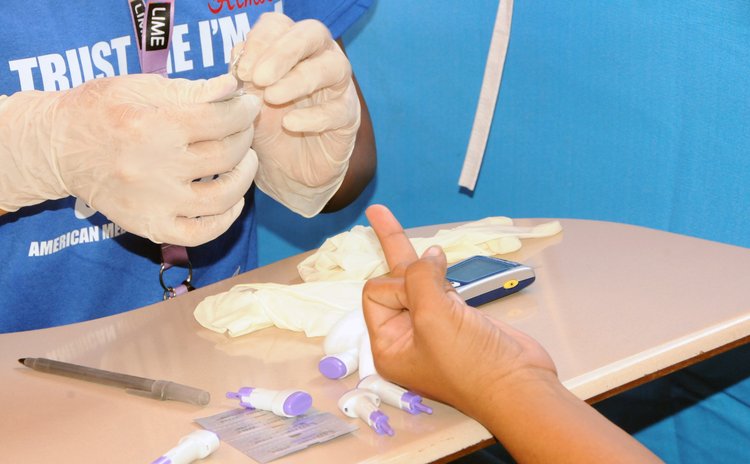Facing the Diabetes Epidemic Together -A Nationwide Responsibility

Throughout the Caribbean, and indeed, worldwide, the devastating effects of Diabetes are wreaking havoc in the lives of communities and nations. But even among our own people, here in Dominica, there exists the perception that Diabetes is a health issue; and solutions can only be found within the health sector. This is certainly not the case. The writing has been on the wall for some time now.
In Dominica, the period of the early eighties was marked by the notable shift in disease patterns known as the epidemiological transition, from under-nutrition to over-nutrition, leading to an upsurge in chronic non-communicable diseases, in which category Diabetes stands.
The 1996 Food Consumption Survey conducted by the Food and Nutrition Council and the Caribbean Food and Nutrition Institute (CFNI) indicated "a shift away from local foods to highly processed imported foods, also high fat intakes". This survey not only made reference to "frequent snacking and high levels of salt intake", but also "unacceptable levels of alcohol consumption". Food balance sheets from F.A.O. reported a rise in per capita caloric intake from 2,254 in 1980 to 3,072 in 1996.
More recently, in the 2007-2008 Ministry of Health Steps Survey on Risk Factors associated with N.C.Ds, the evidence was just as revealing. "46.27% of respondents had 1-2 servings of combined fruits and vegetables per day, but 26.6% ate none at all."
The Global School Health Survey 2007-2008 showed "1/4 of adolescents were overweight and 9.1% obese, 55.8% drank carbonated soft drinks more than twice a day" "and only 23.7% met the recommended levels of physical activity for their age groups." The Health Clinics noted an increase trend towards early discontinuation of breastfeeding which was supported by a weight increase in infants in the 0-5 age group, of 8-7% in 2000 and 12% overweight in 2009. We must therefore conclude that although there is a strong genetic factor in the etiology of Diabetes, unhealthy diets and physical inactivity are the main culprits.
Time for Action
The old adage "Prevention is better than cure" still stands, and this situation calls for the sensitization and mobilization at every level of society – Our Nation; Our Responsibility.
Everyone should be involved – our farmers, families, youth, schools, supermarkets, private and public sectors, churches, but the Government should lead the way to the establishment of a comprehensive Diabetes National Plan: •to prevent Diabetes, •to effectively treat and manage those diagnosed, •and to prevent and treat complications.
The declaration enunciated by Governments of the region over the years at Nassau, Jamaica and Port of Spain were laudable indeed. Slogans like "The Health of the Nation is the Wealth of the Nation", demonstrate the commitment of our leaders. "To provide critical leadership required for implementing agreed strategies for the reduction of the burden of chronic N.C. diseases."
Follow-Up Action
•In Dominica, Caribbean Wellness Day activities are promoted every year. •A C.N.C.D.S. commission was established in the Ministry of Health. •In 2011, a manual for the standardization of management of Diabetes and hypertension was developed through a joint partnership of Ross University and Medical Nursing and Allied Professions.
Impact of Measures Taken
•Has evaluation of the outcome of such measures been done? •How involved are the people with Diabetes and their families in dialogue and decisions about Diabetes Policy, program design, implementation and monitoring? •Is there a cadre of support staff to effectively implement Diabetes Prevention and Care? •Is the Primary Health Care System of the 80's as functional and able to deliver Quality care in this period? •Is self-management by patients given priority? •Does the system support and complement the efforts of the Dominica Diabetes Association? •How much emphasis is placed on training and re-training of staff in an effort to deliver quality care?
We just cannot afford to slip into complacency when numbers of diabetic complications continue to rise beyond our capacity to successfully manage and treat.
Taking Personal Responsibility
Diabetes is largely preventable by paying attention to diet and lifestyles. The emerging culture which attempts to use obesity to boost self-image/esteem is false and creates an oversimplification of the link between obesity and Diabetes. This not only gives a false sense of security but misses a golden opportunity to immediately take decisive preventive action to correct dietary indiscretions.
The fact is: - Obesity affects the ability of insulin to control blood sugar levels. A high blood sugar induces cell death in the beta cells of the pancreas where insulin is secreted. This situation leads to Diabetes over a period of time, hence Prevention is the Watchword!
Other measures:
•Take advantage of screening opportunities especially if there is a family history of Diabetes or have had Diabetes in pregnancy •Pay attention to what you eat; choose wisely •Make physical activity part of your daily routine •Maintain a healthy weight
Diabetes is not mysterious like Ebola; we know what to do, so let's get on with it!
Dominica Diabetes Association; Elenore Lambert CHAIR, Dominica Food & Nutrition Council




